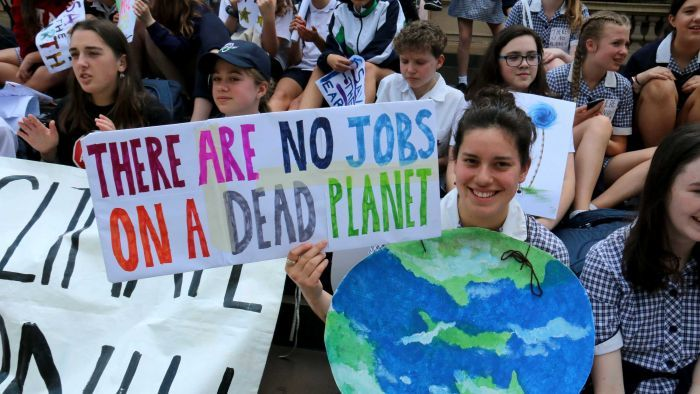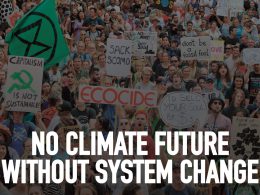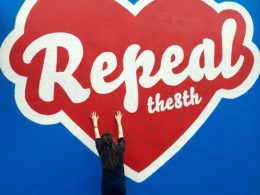In recent months a new movement of school student strikes and protests has emerged globally demanding “system change, not climate change”. Harper Cleves looks at the significance of this movement and why the fight against climate change is bound up with ending the rule of capitalism.
“Be moderate,” the trimmers cry,
Who dread the tyrants’ thunder.
“You ask too much and people fly
From you aghast in wonder.”
’Tis passing strange, for I declare
Such statements give me mirth,
For our demands most moderate are,
We only want the earth.”
– James Connolly
It is, or rather should be, a universally accepted truth that the planet has been irrevocably impacted by humans, and for the worse. Even the name assigned to the current geologic period by scientists reflects this simple fact: the Anthropocene, which literally means ‘the epoch of humans.’1
In the most recent Intergovernmental Panel on Climate Change (IPCC) convened by the United Nations (UN), scientists predicted that we have twelve years before the average temperature of the Earth rises by 1.5 degrees Celsius. After this, any boost in global temperature will drastically increase the risk of natural phenomena such as drought, floods, extreme heat as well as the eradication of coral reefs.
How much can the average human be blamed for climate change? In order to answer this question, it important to note that in some interpretations of the period, the Anthropocene covers the entire stretch of human/ hominid presence on the planet. The earliest hominid is thought to have existed between 5-8 million years ago; the earliest modern human is dated back to 200,000 years ago. And yet, when scientists write about climate change, they typically don’t cover the entire breadth of human existence on Earth. The scientists on the IPCC began their analysis of the negative turn of the Anthropocene in 1880.2 This time period also coincides with an uptick in industrial development and capital accumulation. This suggests that the rapid destruction of the environment is not caused simply by ‘human nature,’ but rather, the rapid advent of the economic system known as capitalism.
This link between the inequality fostered under capitalism and climate change is even made explicit in the IPCC report. The authors point to the fact that, while there has been an increase in wealth globally, as well as an increase in life expectancy in huge swaths of the world, this development is unequal. The report highlights the fact that inequality in access to health and resources has led to a situation in which many regions of the world are not only disproportionately affected by pollution and environmental degradation, but that poverty and severe inequality increase the vulnerability of these populations to the impact of climate change.3
Politicians and the capitalist establishment
The current political establishment offers no solutions to this critical issue, and in fact, stands to accelerate the process. Right-wing and far-right populist political figures like Donald Trump in the United States and Jair Bolsonaro in Brazil represent particularly dangerous responses to the impending climate change disaster. Both men have publicly denied the threat of climate change. Jair Bolsonaro, the newly elected president of Brazil, has consistently (and actually, correctly) counterposed the issues of environmental protection and corporate development.
Early in his presidency, he threatened to leave the Paris Climate Agreement, although he capitulated after international outcry. He has, however, indicated that he will roll back protections on the Amazon Rainforest, including eliminating some indigenous reserves. This is particularly significant in the case of the Amazon, as it was previously thought to represent an important buffer to the effects of climate change.
Donald Trump is similarly dismissive about climate change. He consistently tweets about the ‘global warming hoax,’ most recently pointing to the presence of snow in February in Minnesota as definitive proof that the average temperature of the Earth is not increasing.4 While these sorts of blatantly unscientific claims are largely condemned by working-class people generally, they are unfortunately taken as fact by some of his less politically conscious constituents.
More significant of course, was Donald Trump’s 2017 withdrawal from the voluntary Paris Climate Agreement, which represented a modest dedication by 195 UN countries to curb greenhouse gas emissions. While the deal itself only represented moderate reform under capitalism, leaving the agreement poses a significant danger.
Individual “solutions”
However, it is not only those political leaders on the far right that represent a climate change risk. Mainstream politicians who acknowledge the reality of climate change also pose a risk because, like Trump and Bolsonaro, they represent the interest of capitalism. Leaders of the likes of Justin Trudeau, Theresa May, Emmanuel Macron, Barack Obama, Leo Varadkar and many more speak about addressing climate change not by tackling systemic issues related to corporate overproduction, but by calling on the individual, or in many cases, neo-colonial states, to curb their waste.
For example, in Theresa May’s much anticipated 25-year plan for the environment in Britain, one of her pre-eminent proposals is taxing plastic bags, using market solutions to shift the responsibility of plastic waste to consumers rather than the companies that produce it. There is also the infamous fuel tax imposed by Macron, which sparked the mass ‘gilets jaunes’ (yellow vest) movement across France. Here in Ireland, Leo Varadkar has claimed he wants to make Ireland a leader in combating climate change, and yet the solutions he offers are moderate and regressive carbon taxes and calling on ‘citizen engagement;’ asking people living in the Republic of Ireland to support the policy through their ‘individual purchasing decisions.’
Perhaps the most egregious of these examples is reflected in the statement of Prince William in 2017, who called on people to engage in ‘voluntary family limitation,’ a request that not only ignores the reproduction patterns of the British Royal Family, but also disproportionately targets working-class people from neocolonial states as the root cause of climate change.5 This statement shifts the responsibility for environmental degradation onto marginalised communities, and as such represents a blatantly anti-working class and implicitly racist ethos.
All of these solutions fail to address the issue at hand; that only 100 companies are responsible for 71% of global emissions.6 No amount of ‘individual purchasing decisions’ will solve the problem without tackling the root cause that capitalism poses.
Speaking truth to power
If there is something to be optimistic about in regards to the increasing risk of climate change, it is the sense of urgency and militancy among young people. This is particularly reflected in the person of Greta Thunberg. This Swedish school student, then aged 15, began her solo protests in August following Sweden’s hottest summer, sitting outside of the Parliament building for two weeks handing out leaflets explaining that the adults were ‘shitting on her future’ by not taking climate change seriously.7
The international attention Thunberg garnered from this action earned her the ability to address the UN Climate COP24 conference in December 2018. At this conference, her message to world leaders was direct. While she never references capitalism explicitly, she points to the profiteering of a few as the true cause of climate injustice. She states that “our civilisation is being sacrificed for the opportunity of a very small number of people to continue making an enormous amount of money” she goes on to say that “it is the suffering of the many which pays for the luxuries of a few.”
Thunberg did not ask the world leaders for policy change, because she correctly states that “you have ignored us in the past. And you will ignore us again.” Instead, Thunberg calls on the ‘true power’ of the masses. In perhaps her most widely quoted statement, she says, “If solutions within this system are so impossible to find, then maybe we need a new system.”8
Thunberg has recently been nominated for a Nobel Peace Prize for her efforts. While this recognition from a supposedly reputable institution of the establishment may represent an effort to undermine or neuter her politically, Greta Thunberg has nevertheless already made a mark on society. Her bold and solitary action and her frankness with political leaders earned her international popularity and served to raise the issue of the ‘strike’ tactic among students globally.
School student strikes
Thunberg’s austere bravery in the face of global powers, and her call for systemic change reverberated around the world, striking a nerve with primary and secondary students who see their futures being stolen from them by the powers that be. In the weeks and months following her original actions and this speech, students became increasingly militant. In November protests, thousands took to the streets in Australia. They were told by the prime minister, Scott Morrison, to “go to school” while the education minister Rob Stokes, dismissed the action, telling students “you can’t strike if you don’t have a job.” Most offensively, the resources minister Matt Canavan claimed that by walking out of school, students were ‘learning to join the dole queue.’9
In late February in the United States, a group of students waited outside of California Democratic Senator Dianne Feinstein’s office, calling on her to support Alexandria Ocasio-Cortez’ Green New Deal, a proposed list of economic demands aimed at addressing climate change and economic inequality. These students were met with ridicule from Feinstein, who claimed that the United States government could not pay for such plans, that is was not politically expedient, and that these students, as children too young to vote, simply did not understand politics.
The ridicule and dismissiveness with which students have been met globally seemed only to fuel their sense of militancy. On 15 March 2019, a global student strike was called; mimicking Greta Thunberg’s original solo action. On this day, in countries ranging from South Africa to Argentina, students held signs and led chants referencing ‘system change’ and demanding radical action. In the end, an estimated 1.5 million school students participated globally, with numbers exceeding 10,000 on the march in Dublin – making it one of the largest responses to climate justice to date.10 All of this was planned and executed by school students, 18 years of age and younger, in a state where there is not a strong tradition of school student movements, much less school student strikes.
Many students instinctively made the connection between climate change and capitalism – a link that was implicit in Thunberg’s criticism directed at world leaders. A number of students in Ireland and Britain marched with posters pointing to capitalism as the root source of the problem. In the Spanish State, the School Student Union (led by Revolutionary Left, our sister organization in the Spanish State) marched with a banner that said ‘El capitalismo mata el planeta’ or ‘Capitalism kills the planet’ and similar slogans in cities across the country. These slogans were echoed globally. A significant portion of students see the destruction of the planet as an inevitable and continuous byproduct of capitalism.
Drawing wider conclusions
Of course, to say all school students are making this connection would be an overstatement. Certainly not all students chanting ‘system change, not climate change’ explicitly understand what capitalism is and therefore would likely not naturally see socialism as the solution to environmental degradation at this stage. However, the growing frustration at the immobility, inaction, and patronising of the political establishment has the potential to generate further action and further openness to anti-capitalist and socialist ideas.
Convincing this section of radical young people of the necessity of anti-capitalist and socialist change would position the socialist movement for growth in the years ahead. Working-class students who have been politically activated by this movement, and who have now been exposed to the idea of strikes and walkouts, will go on to be workers in their adulthood. Now is the chance to connect this potential for militancy with the need for continued workplace struggle and a long-term fight for socialist change.
The use of strikes and walkouts as a tactic is noteworthy, not only because it demonstrates the militancy of young people, but also because it has the potential to inspire strike movements of the working class. If school children, many of them working class, effectively garner attention by taking part in a strike, this could potentially signal to workers that they too have the ability to use industrial action to demand changes to improve their lot immediately, but also use this power to challenge the rule of capitalism.
A new generation radicalised
It is also important to situate the student climate strikes in the context of movements globally. The use of strikes and walkouts to call for changes both in and out of workplaces has gained traction in recent years. In 2017, in anticipation of the referendum to repeal the 8th amendment of the Irish constitution, thousands walked out on International Women’s Day as part of the Strike4Repeal campaign in order to call for abortion rights and bodily autonomy for women and pregnant people. This brought the issue of the political strike to the general population, and brought thousands of people onto the streets, effectively shutting down Dublin City centre for the remainder of the day.
In the first half of 2018, students across the country in the United States walked out of class to call attention to the need for serious gun reform in the wake of the High School shooting in Parkland, Florida. Later that same year in the United States and globally, non-unionised workers walked out of their workplaces at McDonalds and then later, Google in order to highlight workplace sexual harassment and place pressure on employers to address this issue. In 2018, in South Korea, India, Chile, Argentina, Brazil, Nepal, Britain, Ireland and Turkey similar protests took place in spontaneous reaction to violence against women, injustice in rape trials, abortion rights and the objectification of women and queer peoples’ bodies.
This year in the Spanish state, a general strike was called for International Women’s Day in order to highlight gender-based violence and macho culture and the need for radical action to combat these societal ills, which in turn placed pressure on many unions to officially support these strike actions. In February, there was also a general strike called to draw attention to the political and democratic repression in Catalonia. Issues such as racism, gender-based discrimination, trans rights, homophobia, housing, health care, and equitable pay have all been flash points of political activism and social movements in the past years, with growing levels of militancy and frustration. The student climate strikes cannot be separated from this. The deterioration of rights, safety and quality of life under capitalism today is leading to growing unrest among the general population and particularly amongst working-class people, especially working-class women and young people. There is growing realisation that these issues are systemic, and cannot be addressed merely through policy reform.
Socialist demands
One fundamental truth must be stated here: there is no solution to climate change under capitalism. Even parties that purport to prioritise climate justice bolster inequality in society as a whole. From 2007 to 2011 when the Green Party was in government in Ireland, there were massive cuts in public transport, and Eamon Ryan, as Minister for Energy, supported the licensing of oil and gas exploration off the west coast of Ireland. Ultimately, the pressures and brutal reality of capitalism impede on the desire for more sustainable options.
What demands should we make as part of a movement for climate justice and socialist change? There should first of all be massive investment in public transport. It is not enough to simply expect people not to drive their cars by implementing a fuel tax, in true Macron-ian form. For people to stop using their cars, they need to have access to reliable, far reaching, affordable public transportation. Thus, there should be a reversal of the privatisation of bus services in Ireland. The expansion of accessible and sustainable forms of transport cannot happen under a system whose primary motive is to generate profit.
Further demands must include a dramatic shift away from fossil fuel dependency. This would begin with the nationalisation and democratic operation of energy companies by the workers in the sector and working people who make use of that energy. The resources of these companies could be used to phase out the use of fossil fuels, with the growth of green energy jobs and a shift towards renewable energy. Additionally, nationalising the construction industry would allow workers to build more sustainable homes on public land, thereby addressing the dual crises of housing shortages and environmental degradation. Taking the agri-business sector out of private hands and into democratic public ownership could allow food production to take place on an environmentally sustainable basis. All of these demands will be resisted by the capitalist class, as they directly challenge their profits, power and the logic of their system.
We absolutely do need “system change not climate change”; time is running out for humanity and our planet. The system we need to get rid of is a capitalist system based on the ruthless drive for profit and the private ownership of the world’s wealth and resources by a small minority. Democratic socialist planning of the economy can mean that we can meet our needs in an environmentally sustainable way. This is the programme that the Socialist Party and the Committee for a Workers International (CWI) will be energetically promoting as we fight alongside a new generation who “only want the earth”.
Notes
1 Simon L Lewis, Mark A. Maslin, ‘Defining the Anthropocene,’ Nature, 519, (2015), 171-180 l 2 Intergovernmental Panel on Climate Change (IPCC), Special Report: Global Warming of 1.5 degrees C, (United Nations, 2018) l 3 IPCC, 2018 l 4 Paul, Deanna. ‘What President Trump keeps getting wrong about ‘global warming.’ The Washington Post, www.washingtonpost.com l 5 Van Maren, Jonathon. ‘Prince William: the latest wealthy population alarmist to ignore his own advice.’ Lifesite, www.lifesitenews.com l 6 Riley, Tess. ‘Just 100 companies responsible for 71% of global emissions, study says.’ The Guardian, www.theguardian.com l 7 Ifran, Umair. ‘Playing hooky to save the climate: why students are striking on March 15.’ Vox, www.vox.com l 8 Thunberg, Greta. ‘Greta Thunberg full speech at UN Climate Change COP24 Conference.’ 15 December, 2018 l 9 Zhou, Naaman. ‘’We’ve been forced into this’: Australia’s school climate strike to go global.’ The Guardian, www.theguardian.com l 10 O’Sullivan, Kevin; Roche, Barry; Dalton, Eoghan; Deegan, Gordon; Maguire, Stephen; Lucey, Anne. ‘Thousands of students in Ireland join international climate change protests.’ Irish Times, www.irishtimes.com












